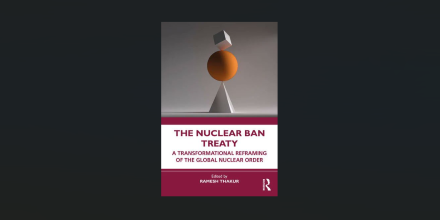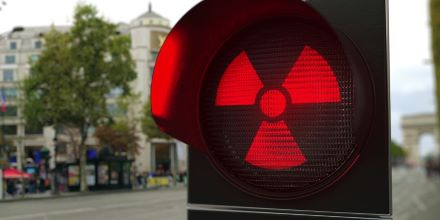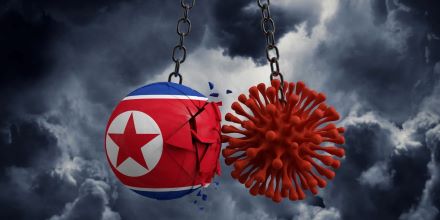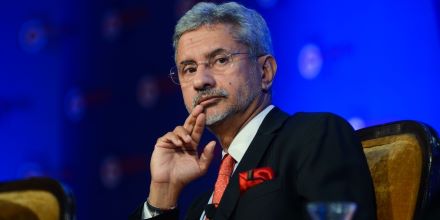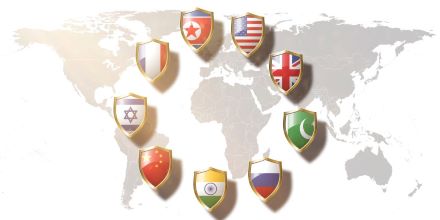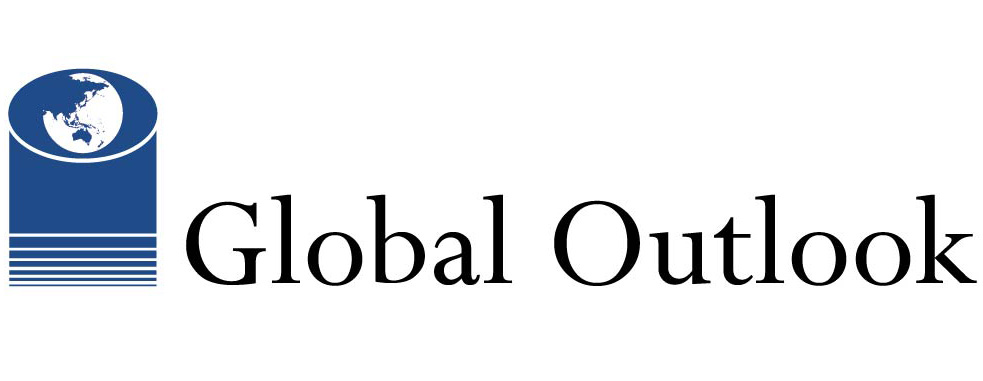
Curated expert opinion on intractable contemporary issues
Global Outlook: Cooperative Security, Arms Control and Disarmament
The Journey from Nuclear Non-Proliferation to Prohibition and Disarmament: Roadmaps, Roadblocks and Speedbumps
By Ramesh Thakur | 28 June, 2022
This is the text of the address delivered by Ramesh Thakur at the launch of The Nuclear Ban Treaty: A Transformational Reframing of the Global Nuclear Order (Routledge, 2022) at the Vienna Center for Disarmament and Non-Proliferation on Friday, 24 June 2022.
Interview with Ramesh Thakur on TPNW
By Shuichi Minami | 20 June, 2022
On the eve of the First Meeting of States Parties of the TPNW, Seikyo Shimbun ran this interview with Toda Senior Research Fellow, Dr. Ramesh Thakur.
Dark Clouds Over North Korea
By Herbert Wulf | 18 May, 2022
In the shadow of the Ukraine war and far from international attention, three problematic developments can be observed in North Korea: COVID-19 infections are a cause for concern, the election of the South Korean president signals a hardening of the fronts and, encouraged by Russia's war in Ukraine, Kim Jong-un’s government continues to focus on the expansion of its nuclear capabilities. This gives rise to fears of nuclear proliferation in Asia.
Double Standards are Normal in Foreign Policy
By Ramesh Thakur | 05 May, 2022
What is it about some Westerners that makes them so singularly lacking in self-awareness as they assume a position of moral and intellectual superiority to issue condescending pronouncements on non-Westerners? In their chapter in the 1999 book The power of human rights, Thomas Risse and Stephen Ropp wrote: ‘Pressure by Western states and international organizations can greatly increase the vulnerability of norm-violating governments to external influences.’
About Football-, Pandemic-, Kremlin- and Military Experts
By Herbert Wulf | 03 May, 2022
A glance at the analyses and conclusions of just about any major newspaper or news website will confirm: the self-proclaimed military experts are in charge, ready to explain to us what "heavy weapons", "no-fly zones", "anti-aircraft guns", "flagships" etc. are. Any why not? They’ve been dealing with the matter for quite some time now, a whole two months since February 24, 2022.
Ukraine Proves UN Cannot Singlehandedly Usher in a Nuclear-Weapons-Free World
By Thalif Deen | 28 April, 2022
The crisis in Ukraine has also revealed the UN's limitations in the "maintenance of international peace and security” as spelled out in the UN charter.
The views and opinions expressed in Global Outlook are those of the authors and do not necessarily reflect the official policy or position of Toda Peace Institute.
The Journey from Nuclear Non-Proliferation to Prohibition and Disarmament: Roadmaps, Roadblocks and Speedbumps
By Ramesh Thakur | 28 June, 2022
This is the text of the address delivered by Ramesh Thakur at the launch of The Nuclear Ban Treaty: A Transformational Reframing of the Global Nuclear Order (Routledge, 2022) at the Vienna Center for Disarmament and Non-Proliferation on Friday, 24 June 2022.
Interview with Ramesh Thakur on TPNW
By Shuichi Minami | 20 June, 2022
On the eve of the First Meeting of States Parties of the TPNW, Seikyo Shimbun ran this interview with Toda Senior Research Fellow, Dr. Ramesh Thakur.
Dark Clouds Over North Korea
By Herbert Wulf | 18 May, 2022
In the shadow of the Ukraine war and far from international attention, three problematic developments can be observed in North Korea: COVID-19 infections are a cause for concern, the election of the South Korean president signals a hardening of the fronts and, encouraged by Russia's war in Ukraine, Kim Jong-un’s government continues to focus on the expansion of its nuclear capabilities. This gives rise to fears of nuclear proliferation in Asia.
Double Standards are Normal in Foreign Policy
By Ramesh Thakur | 05 May, 2022
What is it about some Westerners that makes them so singularly lacking in self-awareness as they assume a position of moral and intellectual superiority to issue condescending pronouncements on non-Westerners? In their chapter in the 1999 book The power of human rights, Thomas Risse and Stephen Ropp wrote: ‘Pressure by Western states and international organizations can greatly increase the vulnerability of norm-violating governments to external influences.’
About Football-, Pandemic-, Kremlin- and Military Experts
By Herbert Wulf | 03 May, 2022
A glance at the analyses and conclusions of just about any major newspaper or news website will confirm: the self-proclaimed military experts are in charge, ready to explain to us what "heavy weapons", "no-fly zones", "anti-aircraft guns", "flagships" etc. are. Any why not? They’ve been dealing with the matter for quite some time now, a whole two months since February 24, 2022.
Ukraine Proves UN Cannot Singlehandedly Usher in a Nuclear-Weapons-Free World
By Thalif Deen | 28 April, 2022
The crisis in Ukraine has also revealed the UN's limitations in the "maintenance of international peace and security” as spelled out in the UN charter.
The views and opinions expressed in Global Outlook are those of the authors and do not necessarily reflect the official policy or position of Toda Peace Institute.
